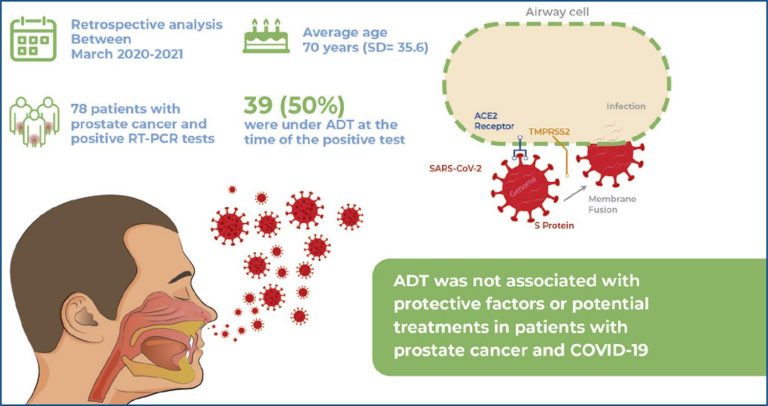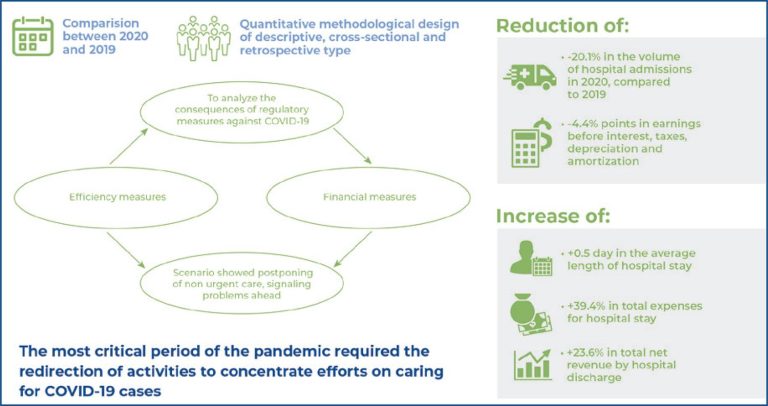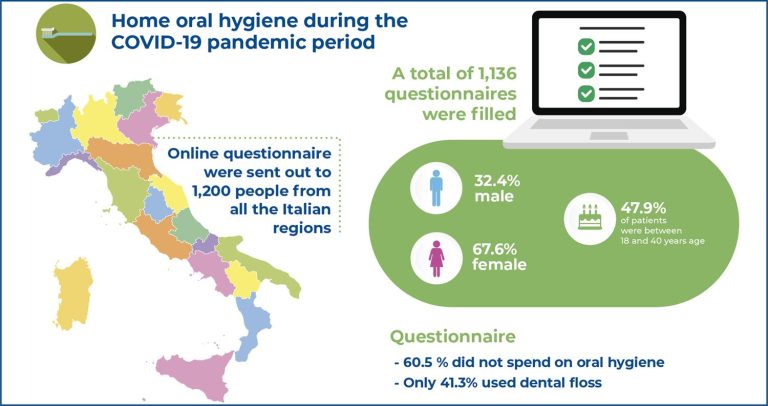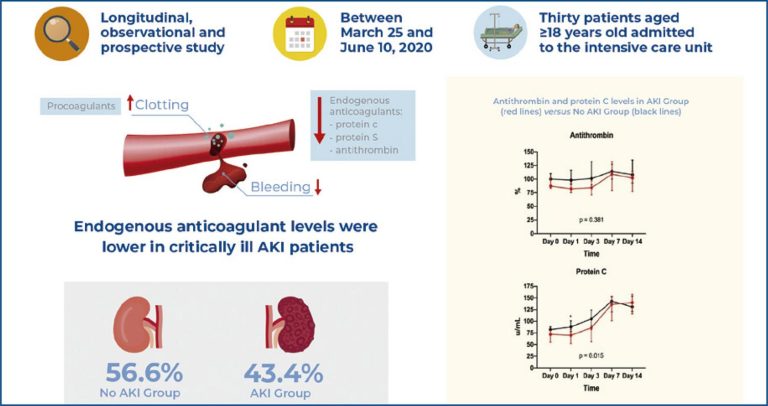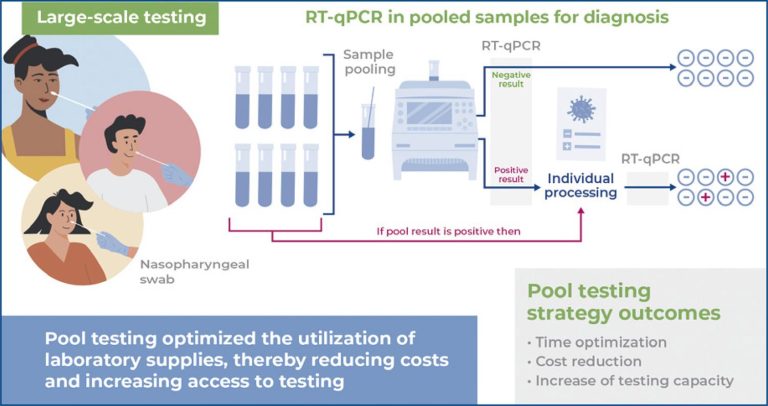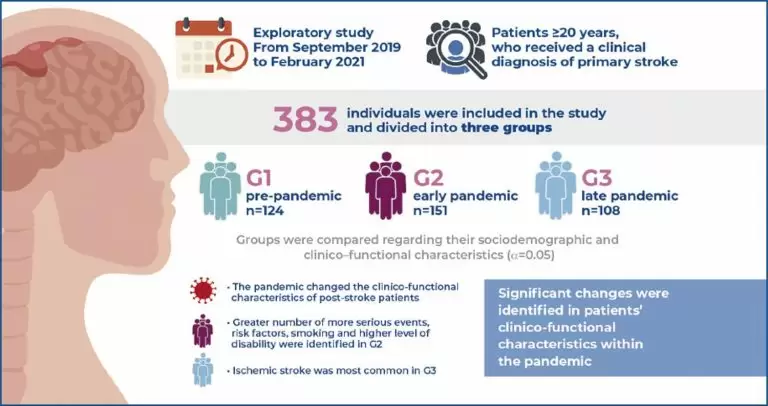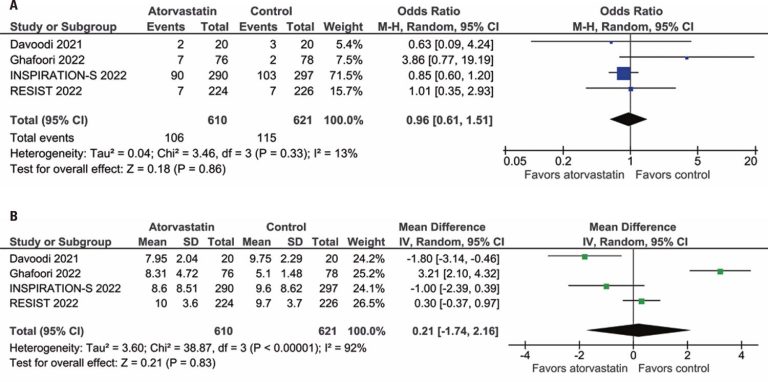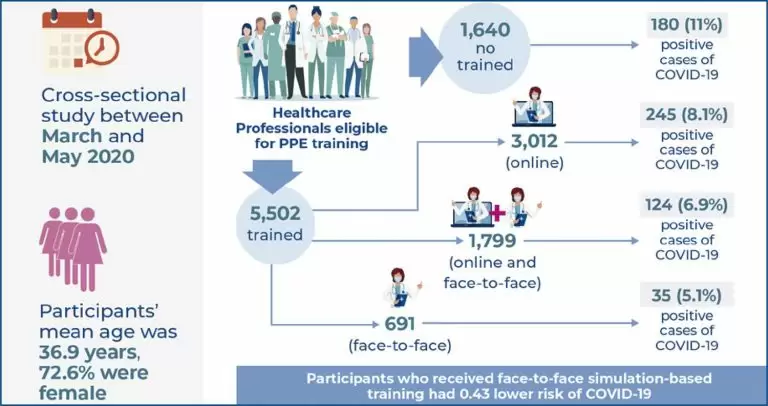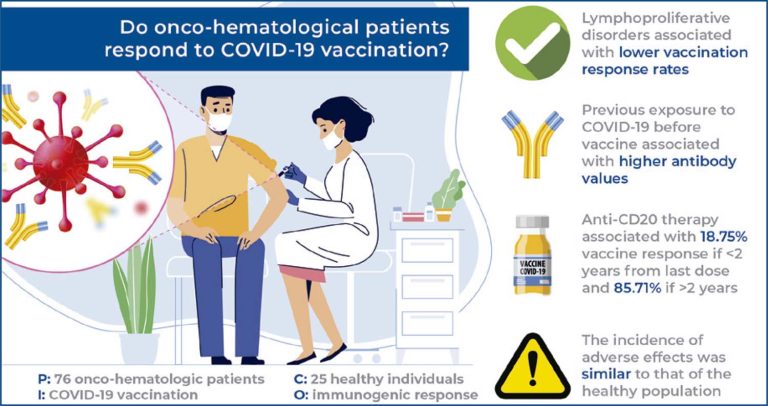11/Oct/2023
Epidemiological profile of COVID-19 in patients with prostate cancer undergoing androgen deprivation therapy at a Brazilian Cancer Center
einstein (São Paulo). 11/Oct/2023;21:eAO0273.
View Article11/Oct/2023
Epidemiological profile of COVID-19 in patients with prostate cancer undergoing androgen deprivation therapy at a Brazilian Cancer Center
DOI: 10.31744/einstein_journal/2023AO0273
Highlights We were unable to prove an association between the use of androgen deprivation therapy and a reduction in factors associated with worse clinical outcomes. Most of the data presented show a tendency to favor the outcomes of patients who do not undergo androgen deprivation therapy, which can be explained by the fact that, in general, their clinical conditions are better and their performance status scores are lower than those of patients who undergo androgen deprivation therapy. ABSTRACT Objective: To […]
Keywords: Androgens; Antineoplastic agents; Coronavirus infections; COVID-19; hormonal; Prostatic neoplasms; SARS-CoV-2
11/Oct/2023
Impacts of the COVID-19 pandemic on private hospitals in Brazil
DOI: 10.31744/einstein_journal/2023AO0174
Highlights Sanitary restriction measures had a strong impact on usual performance indicators from a selected group of private hospitals in Brazil. Pregnancies and deliveries continued to constitute an important proportion of hospital admissions because they did not depend on external restrictions. Hospital costs increased due to increased utilization of more expensive Personal Protection Equipment (due to lack of availability or much higher demand). ABSTRACT Objective: To analyze the operational and/or financial impacts of regulatory measures implemented by the National Agency […]
Keywords: Brazil; Brazilian Health Surveillance Agency; Coronavirus infections; Cost of illness; COVID-19; Health care costs; Hospitals; Pandemics; private
15/Sep/2023
Epidemiological evaluation of patient compliance regarding oral health and hygiene during the COVID-19 period
DOI: 10.31744/einstein_journal/2023AO0195
Highlights Dental and tongue hygiene are key to maintaining systemic health. The questionnaire was sent by e-mail to 1,136 male and female patients throughout Italy. Demonstrate and understand whether patients during the pandemic cleaned and spent time cleaning and maintaining their teeth and tongue hygiene. The questionnaire testifies to the fact that it is not the time but the patient’s compliance and motivation that makes the difference. INTRODUCTION Oral hygiene techniques must be performed not only to maintain oral […]
Keywords: Coronavirus infections; COVID-19; Epidemiologic studies; Oral health; Oral hygiene; Patient compliance; Surveys and questionnaires
30/Aug/2023
COVID-19-associated coagulopathy and acute kidney injury in critically ill patients
DOI: 10.31744/einstein_journal/2023AO0119
Highlights 43.4% of the cohort developed acute kidney injury. D-dimer and fibrinogen levels were high in both groups. Rotational thromboelastometry data were similar between groups. Serum levels of antithrombin activity and protein C were lower in patients who developed acute kidney injury. Objective The incidence of thrombotic events and acute kidney injury is high in critically ill patients with COVID-19. We aimed to evaluate and compare the coagulation profiles of patients with COVID-19 developing acute kidney injury versus those who […]
Keywords: Acute kidney injury; Blood coagulation; Coronavirus infections; COVID-19; Intensive care units; SARS-CoV-2; Thrombosis
Clinical characteristics and outcomes of patients with COVID-19 admitted to the intensive care unit during the first and second waves of the pandemic in Brazil: a single-center retrospective cohort study
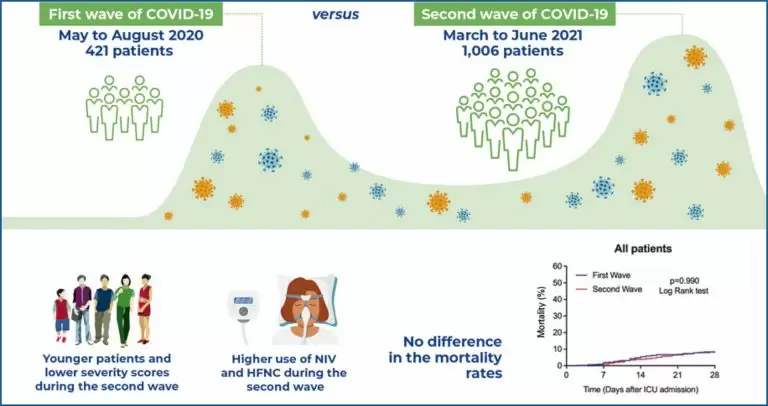
05/Jul/2023
Clinical characteristics and outcomes of patients with COVID-19 admitted to the intensive care unit during the first and second waves of the pandemic in Brazil: a single-center retrospective cohort study
einstein (São Paulo). 05/Jul/2023;21:eAO0233.
View Article05/Jul/2023
Clinical characteristics and outcomes of patients with COVID-19 admitted to the intensive care unit during the first and second waves of the pandemic in Brazil: a single-center retrospective cohort study
DOI: 10.31744/einstein_journal/2023AO0233
Highlights We compared characteristics between patients admitted during the first and second waves. There were 1,427 intensive care unit patients with COVID-19: 421 (first wave) and 1,006 (second wave). The patients in the second wave were younger and less severely ill at the time of intensive care unit admission. Patients exhibited similar mortality rates and need for invasive organ support. ABSTRACT Objective To describe and compare the clinical characteristics and outcomes of patients admitted to intensive care units during the […]
Keywords: Coronavirus infections; COVID-19; Critical care outcomes; Extracorporeal membrane oxygenation; Intensive care units; Mortality; Noninvasive ventilation; Respiration artificial; SARS-CoV-2
23/Jun/2023
RT-qPCR-based pool testing for the diagnosis of COVID-19
DOI: 10.31744/einstein_journal/2023AE0115
Highlights Pool testing is simultaneously performed on multiple samples to efficiently and cost-effectively detect COVID-19. Pool testing can optimize resource utilization and expand diagnostic access, and is a viable alternative for developing countries with limited access to testing. To optimize resources, the pool size was determined by estimating COVID-19 prevalence in the study population. ABSTRACT This study proposes a strategy for large-scale testing among a large number of people for the early diagnosis of COVID-19 to elucidate the epidemiological situation. […]
Keywords: Coronavirus infections; COVID-19; Pandemics; Reverse transcriptase polymerase chain reaction; SARS-CoV-2
06/Jun/2023
Changes in the clinico-functional characteristics of stroke patients in the acute phase during the COVID-19 pandemic
einstein (São Paulo). 06/Jun/2023;21:eAO0226.
View Article06/Jun/2023
Changes in the clinico-functional characteristics of stroke patients in the acute phase during the COVID-19 pandemic
DOI: 10.31744/einstein_journal/2023AO0226
Highlights ■ The clinico-functional characteristics of post-stroke patients changed in the pandemic. ■ The sociodemographic characteristics of post-stroke patients did not change in the pandemic. ■ Post-stroke patients had a greater stroke severity and disability at the beginning of the pandemic. ■ The occurrence of ischemic stroke increased with the advancement of the pandemic. ABSTRACT Objective To compare the sociodemographic and clinico-functional characteristics of patients admitted to a stroke unit immediately before and during two different COVID-19 pandemic phases. Methods […]
Keywords: Coronavirus infections; COVID-19; Health Services; Pandemics; Public health; SARS-CoV-2; Stroke
06/Jun/2023
Effects of statin therapy in hospitalized adult COVID-19 patients: a systematic review and meta-analysis of randomized controlled trials
einstein (São Paulo). 06/Jun/2023;21:eRW0351.
View Article06/Jun/2023
Effects of statin therapy in hospitalized adult COVID-19 patients: a systematic review and meta-analysis of randomized controlled trials
DOI: 10.31744/einstein_journal/2023RW0351
ABSTRACT Introduction COVID-19 is associated with endothelial activation and systemic inflammation; consequently, statins can be used in its treatment as they have anti-inflammatory, antithrombotic, and profibrinolytic properties and may interfere with COVID-19 viral entry into cells through disruption of cell membrane lipid rafts. Objective We performed a meta-analysis of randomized clinical trials that compared statin therapy to placebo or to standard care in adult patients hospitalized for COVID-19. Methods We searched the MEDLINE, EMBASE, and Cochrane Library databases for all-cause […]
Keywords: Atorvastatin; Coronavirus infections; COVID-19; Hydroxymethylglutaryl-CoA reductase inhibitors; SARS-CoV-2
19/Apr/2023
Personal protective equipment simulation training is associated with lower COVID-19 infection among healthcare workers
einstein (São Paulo). 19/Apr/2023;21:eAO0300.
View Article19/Apr/2023
Personal protective equipment simulation training is associated with lower COVID-19 infection among healthcare workers
DOI: 10.31744/einstein_journal/2023AO0300
Highlights All kinds of personal protective equipment training decreased the odds of COVID-19 infection among healthcare professionals.۪ We found lower odds of infection in participants who underwent face-to-face simulation-based training.۪ Simulation-based personal protective equipment training is feasible, effective, and safe, even during the COVID-19 pandemic. ABSTRACT Objective To describe the personal protective equipment training strategies during the beginning of the pandemic and to investigate the association between training and COVID-19 infection among healthcare workers. Methods This cross-sectional study conducted between […]
Keywords: Coronavirus infections; COVID-19; Education, distance; Health personnel; Inservice training; Pandemics; Personal protective equipment; Simulation training
07/Mar/2023
Immunogenicity profile after COVID-19 vaccination in patients with onco-hematological diseases
DOI: 10.31744/einstein_journal/2023AO0089
Highlights Lymphoproliferative disorders were associated with lower vaccine response rates than other disorders. Previous exposure to COVID-19 before vaccination was associated with higher antibody values. The duration of anti-B-lymphocyte therapy related to vaccination had an effect on response rates. The incidence of adverse effects of patients with onco-hematological diseases was similar to that of the healthy population. ABSTRACT Objective To evaluate the influence of onco-hematological pathologies on seroconversion to COVID-19 vaccines, in addition to the effects of chemotherapy treatment […]
Keywords: Coronavirus infections; COVID-19; Immunogenicity; Lymphoproliferative disorders; Multiple myeloma; Myelodysplastic-myeloproliferative diseases; SARS-CoV-2; Seroconversion; Vaccines


